Should schools reopen? Here’s what nearly 3,000 readers said.
"I don’t feel comfortable with my two kids going back to school at all, but if we go to fully remote learning, I would have to quit my job."
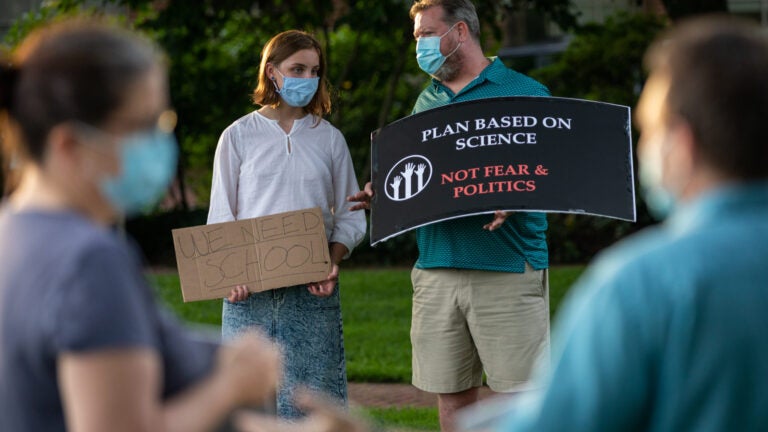
Related Links
Earlier this summer, Education Commissioner Jeffrey Riley instructed school districts to prepare for three options: a full return to in-person schooling in the fall, a hybrid of in-person and online education, and fully online classes. Last week, we asked Boston.com readers which of these options they hoped to see in their area, and over 2,900 people from across Massachusetts wrote in with their opinions. The takeaway? Parents and teachers would prefer that their schools remain remote, please.
Out of 2,908 responses, 73 percent (2,132) were in favor of continued remote learning in their area, 15 percent (438) supported a fully in-person return to school, and only 12 percent (338) supported a hybrid model, with several people sharing that they saw that as the worst of both worlds.

Reader Poll: Should schools reopen?
Teachers want remote learning
Teachers are more hesitant to return to school than parents. Of the 1,234 respondents who self-identified as teachers or school staff, 91 percent favored remote learning, while only 3 percent wanted to return fully in-person. Many cited the lack of research about the effects of COVID-19 on children, poor ventilation systems and upkeep in their schools, and fears about possibly infecting their family members as reasons to stay remote.
“Opening schools in any way even with safety measures in place is reckless and irresponsible. These plans ‘work’ on paper, but do not take into account the human factor of kids who need to act like kids,” said Jennifer Vacca, an eighth grade teacher in Acton-Boxborough who supported fully remote learning. “Schools will not be places that foster learning and community building, but institutions that must stress safety protocols constantly. The consequences of breaking protocols is illness and death. The social and emotional scarring that could result will be detrimental to young people’s development.”
“My sons and I go to 3 different districts. We will be exposed to 153 people every 2 days. Right now, we are exposed to 3 at most unless we are at the grocery store,” said Michelle Harris, a teacher/staff member in Pembroke who also supported fully remote learning. “We have worked so hard to stay safe just to be forced into an uncomfortable situation. [COVID-19] numbers are going up. There isn’t a vaccine or a cure. My children’s grandmother is high risk.”
“In June, I would have argued for all in person or a hybrid model for the fall. But times have changed,” added Kimberly Serra, a teacher in Arlington who also supported fully remote learning. “My father had COVID-19. He is still alive, thankfully, but the effects are lasting. He is suffering from cognitive effects and cardiovascular effects, even months after having [it] (in April). We know that if students go back to school, people will catch the virus. While the death toll might be very low, the risk isn’t worth the reward… The spring was crisis management, not teaching. Choose remote now and teachers will have time to prepare better for what is to come. We can always transition to hybrid or in-person learning if the situation gets better.”
Parents are ‘stuck between a rock and a hard place’
Meanwhile, of the 1,323 respondents who self-identified as parents, 57 percent supported remote learning, while 27 percent wanted to see their student return in person. Many wanted to prioritize in-person learning for younger children and children with special needs.
“I think it’s irresponsible to reopen schools at all. Putting our children and teachers at such an unnecessary risk is a horrifying concept. As someone who has a job in retail who also has to work 40-hr work weeks though, I’m stuck between a rock and a hard place,” said Genevieve Carfagna, a parent in Saugus who supported a hybrid model. “I don’t feel comfortable with my two kids going back to school at all, but if we go to fully remote learning, I would have to quit my job in order to homeschool my kids, and our family would be unable to survive on just my husband’s paycheck alone.”
“I work [the] night shift, my wife and I are not native English speakers. It’s a nightmare to have 2 boys, ages 8 and 9, at home. I would like them back to school in person,” said Ken Chen, a parent in Quincy.
“My son has special needs that would be difficult for him to learn remotely, added Anthony, another parent in Saugus. “I fully understand the need to keep children and teachers safe but my son will be directly hurt and left behind if he isn’t afforded the opportunity to meet with therapists and teachers in person.”
“I want my kids to go back to school part-time, but I am still very worried. My concerns are that there is a population of people who are not taking this serious enough and that kids will not be properly following the safety precautions,” said Angela Dolan, a parent in Swansea who supported a hybrid model. “I feel as if the parents are going to pass their complacent attitude into their kids. I don’t know how parents are supposed to have confidence that the kids that we are exposing our children to are doing the right things.”
“Kids need to be in a classroom setting to get the most out of their education and to [socialize] with their peers. Nothing is more miserable than forcing kids to sit in zoom calls and try to engage online,” said Jane, a parent in Arlington. “With proper precautions, I hope kids can be in the classroom even part time as it will help build relationships with their new teachers which would be hard to establish in fully remote.”
Others are frustrated and see a ‘nightmare’ ahead
Although hybrid learning has been billed as the balance between in-person and remote education, few people saw it as the best option.
“Hybrid models look great on paper, but for a teacher, it’s a nightmare,” said an anonymous teacher in Peabody. “Having 1/2 students in class and 1/2 on zoom. What are the kids on Zoom supposed to do? Do I give them projects or independent work….or are they participating via livestream? How do I then focus on my students in the classroom and the students who are live-streaming my lesson?”
Some respondents also reported frustration with teachers who were hesitant to return to in-person classes.
“We need to get these kids back to school and stop giving into the teachers union. Low income and minority kids will suffer the most,” said Will Vazquez, a parent in Milford. “Why does every other profession have to go back to work[?] Are teachers better than everyone else? What about service workers and cashiers who have been working the entire time.”
“The teachers want an endless summer vacation. Get back to work and earn your $80,000+ salary,” added an anonymous Manchester-Essex resident. “Kids need to be socialized, the six month vacation is over. Do not sacrifice our children for your laziness, get back to work.”
Where you live matters
Whether respondents wanted to see school return to in-person learning, through a hybrid model, or remotely also depended on where they were located. In larger cities, people tended to be open to online school; 73 percent of respondents in Boston, 83 percent of those in Worcester, 85 percent of those in Springfield, and 88 percent of those in Lowell supported fully remote learning.
“[I’m a] single mom and self-employed photographer in the wedding industry, so I’m essentially unemployed for the time being, and I can be home to help my son with remote learning,” said Korri Crowley, a parent in Boston. “Remote learning is the only responsible plan at this time. If his district does not provide a supportive and dynamic plan for the families, I will unenroll him and we will independently homeschool.”
In smaller towns with fewer active cases, however, some people felt the risk was too small to justify keeping schools closed.
“There is one active [COVID-19] case in my town. Last week there were zero cases. But the schools are delaying the opening and doing the hybrid model,” said John Osborne, a parent in Winchester who supported a fully in-person return to school. “How [many fewer cases] do you need to allow full in-person learning?”
In all, 176 cities and towns in Massachusetts were represented by four or more respondents. Of those 176 towns, only five districts — Boxford, Dover-Sherborn, Masconomet, Saugus, and Triton (which serves Newbury, Rowley, and Salisbury) — had a majority of respondents vote for fully in-person school in the fall.
“Kids need the in-person education and they need the social interaction with their peers. Working parents aren’t a good substitute,” said one anonymous Boxford parent, who supported a full return to classes.
Whether respondents supported in-person, hybrid, or remote learning, respondents want to put the best interests of children first.
“I am an occupational therapist in a therapeutic day school for children with Autism Spectrum Disorder. They have no sense of personal space/hygiene so staff will need to have full PPE…and they may have adverse reactions to seeing staff in PPE,” added Ashley, who lives in Lawrence and supports a hybrid model. “On the other side they did not fully participate in remote learning and many did not get a lot out of it. Seems like there’s no right answer.”
Responses have been lightly edited for length and clarity.
Get Boston.com's browser alerts:
Enable breaking news notifications straight to your internet browser.
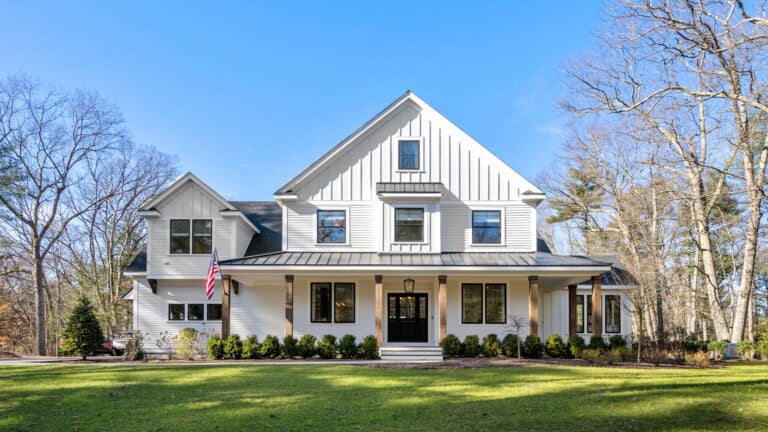



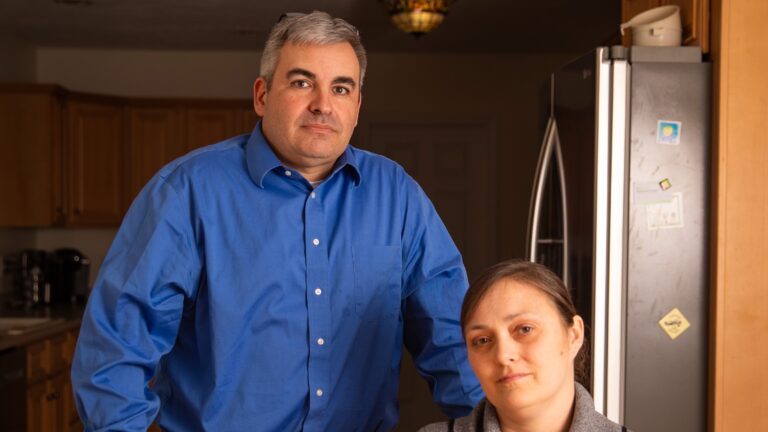
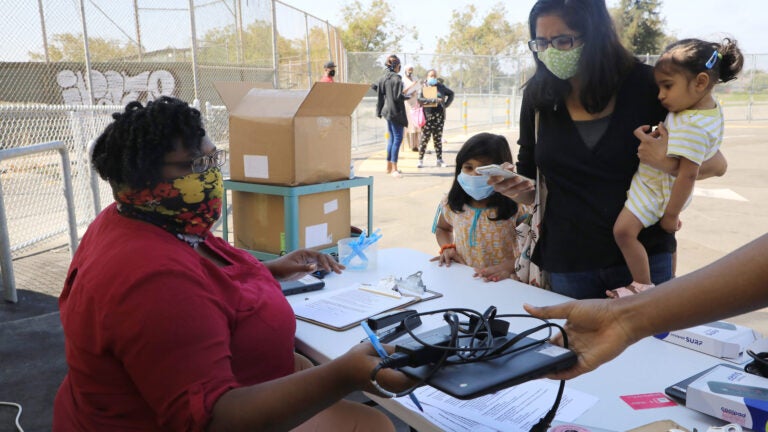

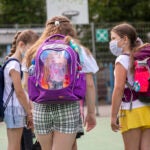
Conversation
This discussion has ended. Please join elsewhere on Boston.com